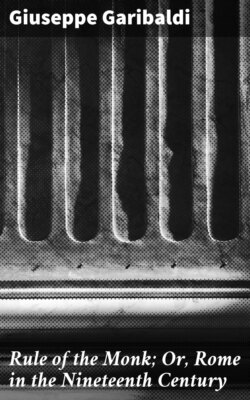Читать книгу Rule of the Monk; Or, Rome in the Nineteenth Century - Garibaldi Giuseppe - Страница 13
На сайте Литреса книга снята с продажи.
CHAPTER VI. THE ARREST
ОглавлениеTable of Contents
We took leave of Manlio at the moment when Gianni had delivered his master's message. The sculptor acceded to the Cardinal's request, and, after an interview with him, proceeded to execute the order for the statuettes. For some days nothing occurred to excite suspicion, and things seemed to be going on smoothly enough. From the room which Gianni had hired Cencio watched the artist incessantly, all the while carefully maturing his plot. At last, one evening, when our sculptor was hard at work, Cencio broke into the studio, exclaiming excitedly, "For the love of God, permit me to remain here a little while! I am pursued by the police, who wish to arrest me. I assure you I am guilty of no crime, except that of being a liberal, and of having declared, in a moment of anger, that the overthrow of the Republic by the French was an assassination." So saying, Cencio made as though to conceal himself behind some statuary.
"These are hard times," soliloquized Manlio, "and little confidence can be placed in any body; yet, how can I drive out one compromised by his political opinions only—thereby, perhaps, adding to the number of those unfortunates now lingering in the priests' prisons? He looks a decent fellow, and would have a better chance of effecting his escape if he remained here till nightfall. Yes! he shall stay." Manlio, therefore, rose, and, beckoning to the supposed fugitive, bade him follow to the end of the studio, where he secreted him carefully behind some massive blocks of marble, little dreaming that he harbored a traitor.
Manlio had scarcely resumed his occupation before a patrol stopped before the door and demanded permission to make a domiciliary visit, as a suspected person had been seen to enter the house.
Poor Manlio endeavored to put aside the suspicions of the officer, so far as he could do so without compromising his veracity, and, little divining the trap into which he had fallen, attempted to lead him in a direction opposite to that in which the crafty Cencio had taken refuge. The patrol, being in league with Cencio, felt, of course, quite certain of his presence on the premises, but some few minutes elapsed before he succeeded in discovering the carefully-chosen hiding-place; and the interval would have been longer had not Cencio stealthily put out his hand and pulled him, the sbirro, gently by the coat as he passed. The functionary paused suddenly, exclaiming with an affected tone of triumph, "Ah! I have you!" then, turning upon Manlio, he seized the artist by the collar, saying, in the sternest of tones, "you must accompany me forthwith to the tribunal, and account for your crime in giving shelter to this miscreant, who is in open rebellion against the government of his Holiness."
Manlio, utterly beside himself, in the first burst of indignation, cast his eye around among the chisels, hammers, and other tools for something suitable with which to crack the skull of his insulter; but at this moment his wife, followed by the lovely Clelia, rushed into the apartment to ascertain the cause of so unwonted a disturbance. They trembled at the sight of their beloved one in the grasp of the hated police-officer, who cunningly relaxed his hold, and said, in a very different voice, as soon as he perceived them, "Be of courage, signor, and console these good ladies; your presence will be needed for a short time only. A few questions will be asked, to which undoubtedly you can give satisfactory replies."
In vain did the terrified women expostulate. Finding their tears and remonstrances of no avail, they reluctantly let go their hold of the unhappy Manlio, whom they had clasped in their terror. He, disdaining any appeal to the courtesy of such a scoundrel as he knew the patrol to be, waved them an adieu, and departed with a dignified air.
